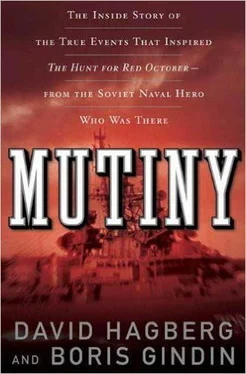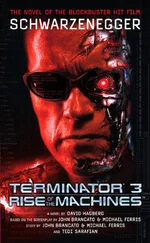Go into the service as an enlisted man and any sort of a real career was impossible. It was a life he did not want to contemplate.
His father, a man whom Boris adored, was an engineer. Boris was going to follow in his father’s footsteps. But not as a civilian. Iosif was the sole breadwinner in the Gindin family, and even as an engineer he was barely making 160 rubles per month. That was scarcely enough to pay the rent on their small apartment and put food on the table. At first the Gindins shared a small apartment with several other people, the three of them living in one room. The Gindins never had good things; the furniture was shabby and primitive, their clothing hand-me-downs from relatives, they never had a vacation, and when Iosif had to go into the sanatorium for his failing health a difficult life got even tougher.
“You want to be an engineer, I can get you into the academy,” Boris’s brother-in-law, Vladimir Simchuk, said one evening over dinner.
“Gas turbines,” Boris said. He’d already been having the dreams.
The St. Petersburg Military Engineering Academy is in Pushkin, but the locals call it Tsarskoye Selo because the last tsar had his summer residence there. It’s a lovely little town whose palaces and gorgeous parks, which are especially spectacular with the changing leaves in the fall, were created in the eighteenth century by the empresses Elizabeth and Catherine the Great.
Vladimir was in his fifth year at the academy and was doing very well. His grades were good, he was on the school’s weight-lifting team—a sport that Gindin had practically made a career of in high school—and, best of all, the head of Vladimir’s rota, or company, Captain Third Rank Spartak Svetlov, agreed to put in a good word for Boris.
The academy, which only dates back to a few years after the revolution, is located on a few acres of prime parkland near the Catherine Palace and was home in those days to fifteen hundred engineering students taking the five-year courses.
In order to be accepted out of high school, Boris had to take and pass five tests: verbal and written mathematics, verbal physics, literature, and sports fitness, plus an extensive physical exam. Dumb, sick students are not accepted. This is the elite school. He gets a decent mark in physics and does very well on the other four. His grades are good enough to ask for any five-year course of study he wants. Steam Turbines, Diesels, Submarines, or the newest, most glamorous, sexiest course of all, Gas Turbines. With gas turbines his advancement in the navy will be rapid, and once he retires his career as a civilian will also be all but guaranteed.
That was the easy part. The second, biggest hurdle was meeting with Admiral Nikolaev who was the head of the academy, and two of his officers: the faculty commander and the assistant for military training.
It was mid-August in Pushkin, pleasant, not too hot, the fall colors already beginning to show, when Gindin showed up for his interview in the school’s Administration Building. It was a big conference room with three large windows through which the sun streamed. Immediately to the left was a long table, behind which sat the three officers.
“You did well on your exams, Comrade Gindin,” Admiral Nikolaev complimented Boris. The admiral is an old man, in his mid-sixties, with a longtime active navy career behind him. The students think of him as a father, because he is stern but warm and friendly. If you have a problem, the admiral will listen.
The other officers on the interviewing commission weren’t so nice; in fact, the colonel who was Admiral Nikolaev’s assistant for military training had never served in the active navy and was a mean, condescending man. Everyone in the school knew that if you happened to meet him on the street, you’d better cross over to the other side before he noticed you, because he was sure to find some fault and send you to your rota captain for disciplinary action.
The main thing the admiral and his two officers want from Gindin is the promise that he is ready to dedicate his life to serving his country. That means dedicated to giving his life for the Rodina, Mother Russia. Shedding his blood for the Soviet Union if need be.
Gindin is young, just seventeen, the navy is the glamour service: prestige, an impeccable reputation. Its officers are considered to be a part of the Russian elite that got its start with Peter the Great, who established the navy and, therefore, Russia as a world power.
This moment is the very beginning of Gindin’s life.
“Da,” he enthusiastically responds. Yes, he will dedicate his life to the Rodina; he will shed his blood for the Motherland if called upon to do so. As a gas turbine engineer, taking care of the power plants aboard the newest, most modern ships anywhere on earth.
But he had not counted on one fatal flaw. Despite his Russian passport, the admiral and his officers know that Gindin is a Jew. It was his first, though not last, experience that being a Jew in the Soviet Union meant fewer choices. Here at the academy it meant that sometimes you had to step out of someone else’s way so that his career could advance.
“We have no room for you in Gas Turbines, Comrade Gindin,” the colonel says, with a smirk. “You will be joining the diesel facility.”
Gindin nods dumbly. No other choice is open for him, not really. The diesel curriculum is easier, but it has less prestige and less opportunitiy than gas turbines. And since the gas turbine major is tougher, only the guys who did the best on the exams get chosen. This knocks the wind out of Gindin’s sails, because he knows he did very well. But he keeps his mouth shut because no one here is interested in his side of the story. He figures that he should consider himself lucky that he was accepted at all. Lucky and grateful.
“Da,” he will faithfully serve and defend the Motherland as a diesel engineer.
But two weeks later someone has pulled some strings, probably Gindin’s brother-in-law, and without any explanation he is suddenly transferred to Gas Turbines. He never questions the change in orders, but for the first few days he floats a few centimeters above the ground.
3. COLD WAR CONSIDERATIONS
1968
The period between the end of WWII and the early nineties, when the Soviet Union finally collapsed, was called the Cold War because the USSR and the United States were not shooting at each other. But both sides were constantly on alert for the hot war to begin. That meant Soviet missile forces were drilled 24/7 to launch their ICBMs against targets in the West. It meant that Soviet pilots stood by their interceptors and nuclear bombers. It meant that the vast Soviet armies were poised to pour across the border into West Germany. And it meant that the navy was almost always training for the big day.
The idea of Mutual Assured Destruction, MAD, that in the event of a global thermonuclear war no one could survive, was all that prevented a third world war. The Soviets, like the Americans, depended on what was called the triad: nuclear weapons delivered by long-range bombers, nuclear weapons delivered via silo- or train-launched ICBMs, and nuclear weapons launched by submarines.
It was to this last leg of the triangle that the navy and its Anti-Submarine Warfare (ASW) vessels, such as Gindin’s ship, the FFG Storozhevoy, were so important. A submarine could sneak to within spitting distance of the Russian coast and launch its missiles so that no warning would be possible. By the time the military defense forces knew that an attack had begun there would be absolutely nothing to be done. Innocent people would die. The Rodina would be wounded. Possibly mortally.
Sailors aboard ASW platforms, as they are called, were filled with a holy zeal. If submarine-launched missile attacks could not be defended against, then the submarines themselves would have to be detected and destroyed before they could launch.
Читать дальше












